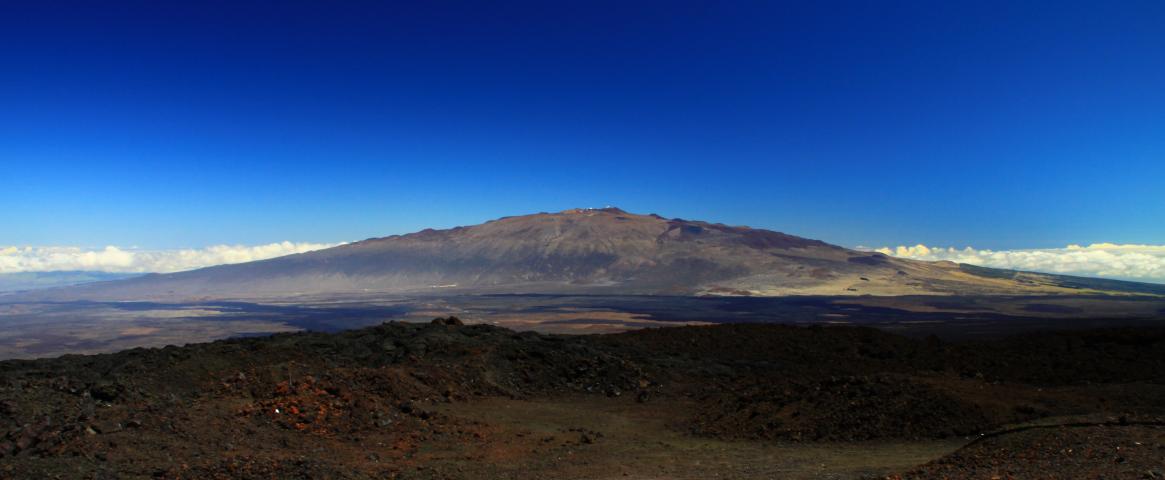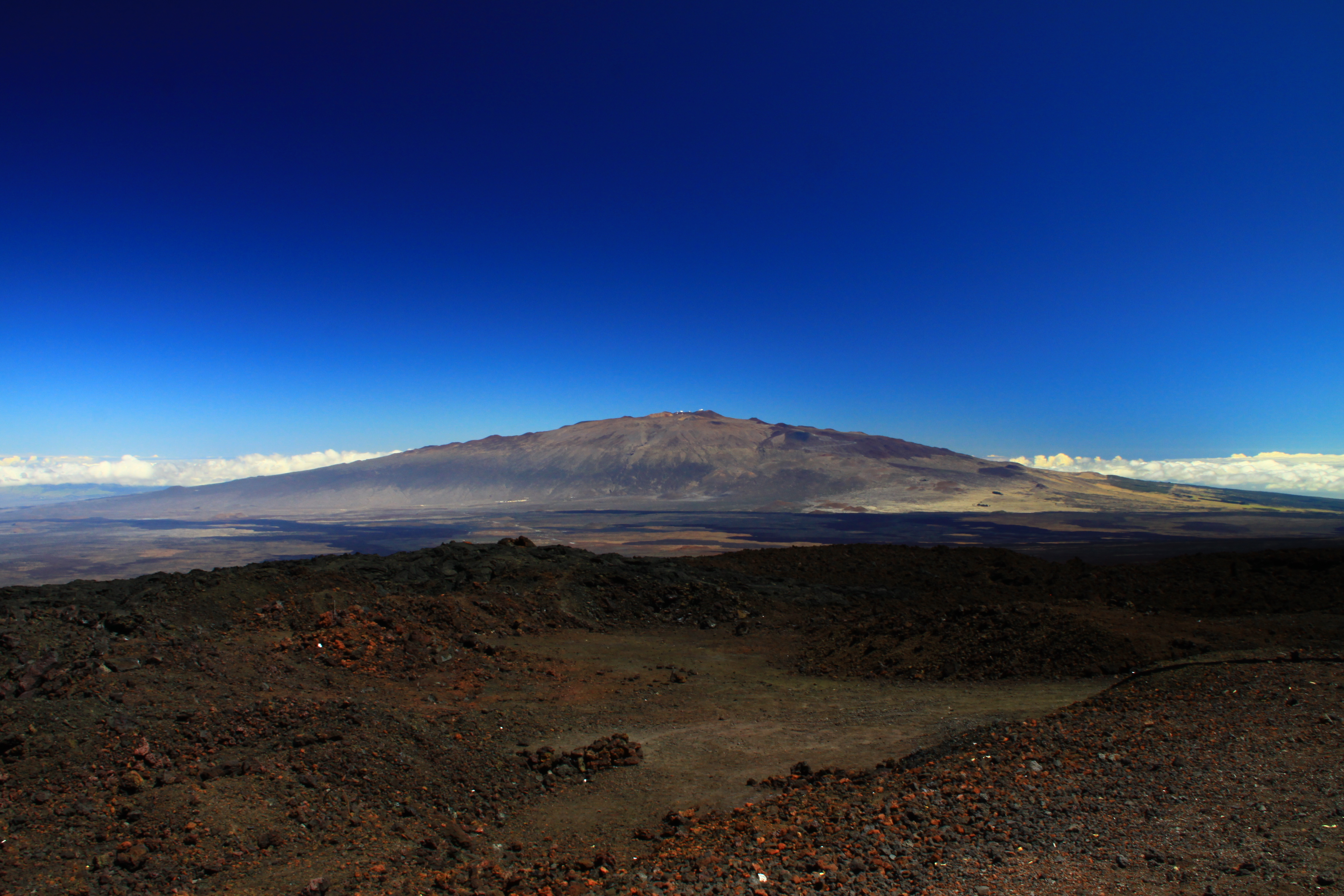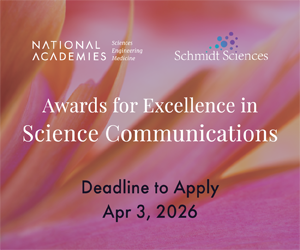By Zoë Wright
Winding up the slopes of Hawai’i’s highest mountain, visitors are quickly immersed in the state’s rich flora and fauna. Farther up, they can look out onto the glittering Pacific Ocean, and, at night, view the clearest skies in the Northern Hemisphere, ones in which stars speckle the entire evening horizon. But these beautiful scenes conceal a darker side of the mountain, called Mauna Kea, for its slopes are a battleground. The dormant volcano is consecrated ground for the Native Kānaka Maoli people: it is the sacred home of the gods. “The connection between the land and the people there runs deep,” says Kanaka Maoli native Sara Kahanamoku. The Kānaka Maoli people, she explains, have long been fighting to keep their mountain since the first western astronomers observed there in the nineteenth century. Since then, western astronomers, with the support of non-Indigenous governments, have ignored Kānaka Maoli traditions and knowledge, electing to build 13 telescopes on the sacred mountainside. More recently, in 2015, tensions on Mauna Kea reached a boiling point, when Kānaka Maoli elders were arressted while peacefully protesting the proposed construction of yet another telescope — this time a Thirty-Meter Telescope, often called TMT.
Should TMT be built, it would be the 14th telescope constructed on the mountain without Kānaka Maoli consent, yet another reminder of colonialism in science, and its inherent aversion to cross-disciplinary pollination. To address these broader issues as they relate to TMT, along with her opposition to the latest telescope project, Kahanamoku, a graduate student in paleontology at University of California, Berkeley, coauthored a paper earlier this year in which she and her colleagues, all Indigenous Americans, describe steps to begin a reconciliation process between astronomers and the Kānaka Maoli. Kahanamoku recently spoke with (Science Writers/Undark) about the paper, the growing tensions between Indigenous and scientific communities, and the propitiation that could help make Mauna Kea a leading example in the process of decolonizing western science.
Zoë Wright: What made you first get involved with Mauna Kea?
Sara Kahanamoku: Well I am Kanaka Maoli, so that originally got me involved. To be honest, I’m not an astronomer, so the Mauna Kea situation was not something that was ever in the forefront of my radar. When I got to my university program, I was the only Native Hawaiian student, and to this day I believe there’s only something like three or four Native Hawaiians who hold science doctorates. The lack of diversity really pushed me to look more into the situation. Myself and other Indigenous academics decided that the best way for us to get involved was through writing. Last year, several of us were asked to write a paper from Native voices opposing the TMT project, so that’s how it came about.
ZW: You say a lot of this stems from colonialism in astronomy, could you go into a bit more detail about that history?
SK: The history of colonization and astronomy on Hawai’i is ancient. The first real instance was when the Kānaka Maoli allowed Stephen Reynolds to observe and study solar eclipses from Hawai’i in the nineteenth century. Once there was this notion that the Kānaka Maoli were ignorant about science and willing to share the land, colonization just escalated to what we see today.
ZW: It sounds like there is a great disregard in science for Indigenous ways of knowledge. How do you think science could benefit from including Indigenous thought?
SK: I think one of the beauties of science is that it can have this 360-degree view, when intersectionality is integrated. Right now, science is very prescriptive to this western superiority idea, which has lost a lot of knowledge from the field, from Indigenous peoples of course, but other groups as well.
ZW: In your paper you outline seven steps to begin a reconciliation process between astronomers and the Kānaka Maoli. What is the biggest take away from these suggestions? How would they best be implemented?
SK: Stop the construction of TMT now. That’s the first step that must be taken. That’s the only way we are going to feel like we are being listened to and begin to revisit discussions. We also suggest all astronomers using the telescope (should it get build) for observational purposes partake in an educational course about the native Hawai’ian understandings of astronomy. Of course, these are all baby steps towards decolonizing science as a whole.
ZW: There’s a lot of turmoil in the US right now about race and ethnicity. Do you think this could have an impact on how your paper is received?
SK: Hopefully. It’s hard to say really, since this has been happening so long. But hopefully the pressure will continue and can begin some real change.
ZW: Finally, do you think it’s too late for the astronomy community to reconcile with the Indigenous community?
SK: It’s going to take a lot of work. Decolonization requires a solid divestment from whiteness, and I honestly don’t know if we are there yet. There’s a lot of hurt and anger on Mauna Kea, so listening sessions and consent from the whole community are going to need to be the starting points. After construction is halted, of course.
Zoë Wright is a student at Mount Allison University, and has completed an honors in Astronomy. They will be returning this winter to finish their mathematics degree. Zoë is a research assistant and public educator with the Physics department at Mount Allison, a regular contributor to their School’s newspaper, “The Argosy”, and host of the campus radio show ‘’Acid Drop’’. You can follow them on twitter at @o_captain_x or email them at zee.orca9@gmail.com.
This story was produced as part of NASW's David Perlman Summer Mentoring Program, which was launched in 2020 by our Education Committee. Wright was mentored by Ashley Yeager.




